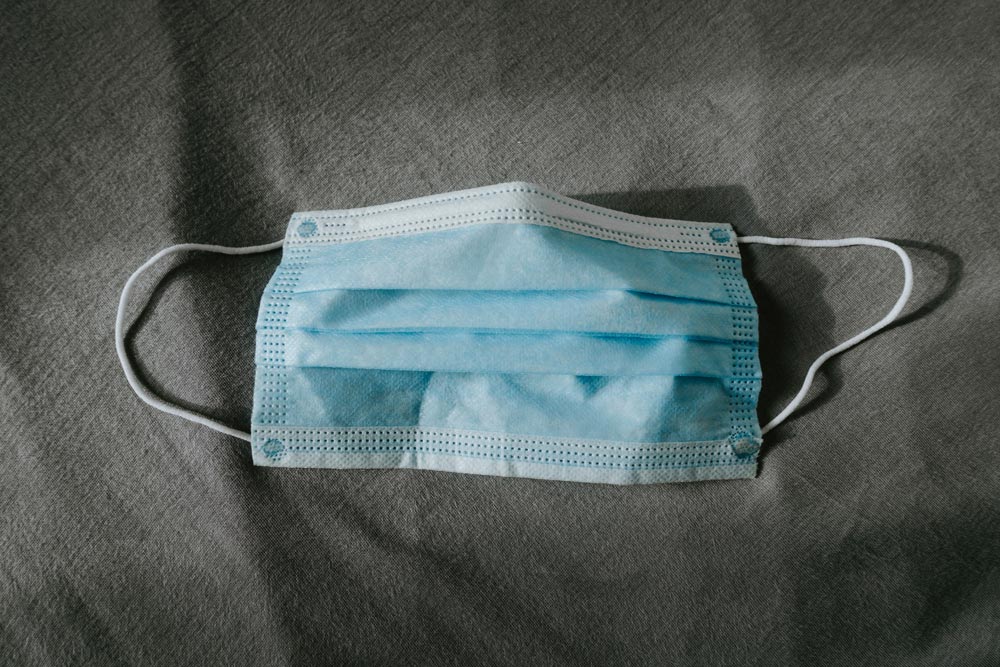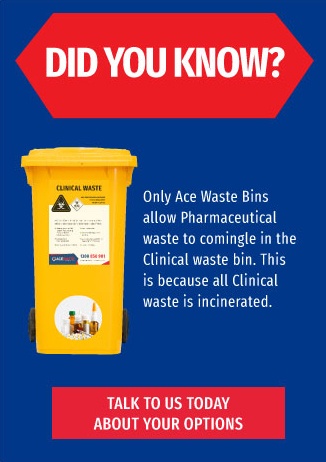The issue of medical waste has long been apparent and it’s been something that the team at Ace Waste has always worked hard to treat — according to proven protocol and procedure.
However, with COVID-19 continuing to make its effects known, increased amounts of medical waste are becoming more of a problem. Given the current pandemic environment, the COVID-19 waste (and other forms of waste) generated by healthcare industries has surged across the world. If you’re a provider, it’s crucial to remain compliant in an ever-changing landscape.
The need to follow standards in safely handling and treating this waste stream could not be more evident.
What is medical waste?
The simplest definition of medical waste is any waste generated by the healthcare industry, predominantly at doctors surgeries, hospitals, dentists, veterinarians, aged-care facilities and other laboratories (such as mortuaries/autopsy centres, blood banks etc.). However, the term is used interchangeably depending on your location in the world.
At Ace Waste, we adhere to Queensland and Victorian State legislation (the locations in which we operate) in the categorisation of various waste streams and use the term “clinical and related waste” to describe what others deem to be medical waste.
The World Health Organisation (WHO) has its own particular categorisation of medical waste. For a more global perspective, with obvious parallels, you can visit their appropriate webpage.
Where does the medical waste go?
The problem with medical waste is that it sometimes doesn’t wind up in the places it should safely go. You see, sometimes people don’t realise what is categorised as medical/clinical and related waste and make the mistake of disposing of it as general waste.
When this type of untreated waste becomes landfill it seeps into landfill leachate and can permeate into groundwater sources. This presents a significant threat to the environment, animals and, of course — to people. The concern is heightened if the medical waste is infectious, cytotoxic (toxic to cells) and/or radioactive in nature.
Other times medical waste is dumped completely indiscriminately. It may end up in our oceans, eventually washing ashore. This improper and even criminal disposal of this type of waste means that blood-borne viruses have a good chance of being transmitted to humans, eg. stepping on the needle of a syringe on a beach.
Effects of medical waste on the environment
From an ecological perspective, there’s also a huge risk. Initial contamination can spread, affecting all organisms in the food cycle deleteriously, eg. a culture dish contaminates an underwater plant; a fish eats this plant and becomes sick; a person catches this fish and consumes it and also becomes seriously unwell.
Preferred method of destruction
When medical, ie. clinical or related waste, is destroyed with intention and care there is still the matter of the method of destruction used. Clinical and related waste must be either autoclave-landfilled, incinerated, or treated as per official Clinical and Related Waste Guidelines. One of the major differences between these two methods of destruction is maintaining complete biosecurity in their processes.
An autoclave (its operation is almost akin to a traditional pressure cooker) only heats the material inside of its pressurised chambers and will not reduce the overall volume or mass of waste items and by-products. Therefore, the problem of disposing of significant amounts of waste remnants in landfill still exists.
Not all pathogens, eg. infectious prion proteins like CJD (Creutzfeldt-Jakob disease), can be eliminated via the autoclave process. Dangerous pathogens have the potential to lie dormant in the earth after being disposed of in landfill. They can arise as highly toxic environmental hazards as the years progress.
What is high temperature incineration?
High-temperature incineration safely destroys all waste related hazards and can reduce the mass of waste by up to 90% in the process. Otherwise put, incineration ensures complete destruction of your waste, including all by-products and remnants. This makes it the preferred method of waste destruction.
Where do I dispose of medical waste?
WHO reports that “Every year an estimated 16 billion injections are administered worldwide, but not all of the needles and syringes are properly disposed of afterwards.” This illustrates just one aspect required in the proper disposal of medical waste, ie. the correct use of waste containers or sharps containers.
This is alongside delivering a comprehensive range of waste disposal and management solutions for almost any type of waste or waste-related requirement. We are referring to our total waste management solution.
Controlling the dangers of medical waste
During the peak of the COVID-19 pandemic, there were around 115 aged care facilities in Victoria with active Coronavirus cases. Many of these locations were previously disposing of 1-2 wheelie bins weekly and increased to more than 12 bins a day! The COVID-19 waste included single-use masks, eye protection, gloves and gowns. That’s nearly a 100-fold increase from the year before
Given the current pandemic environment, the waste generated by healthcare industries has surged across the world. If you’re a provider, it’s crucial to remain compliant in an ever-changing landscape. Waste from medical source(s) represents unprecedented risks to humans, animals and our shared ecosystem.
There is a dire need for all those who generate any form and/or by-product of medical waste to dispose of it via the correct channels. You should be using a licensed and authorised professional service which operates using the preferred method of waste destruction in high-temperature incineration.
Take the right action in waste collection and disposal today
This is exactly what we provide at Ace Waste. We make sure you have a solid and stringent answer to that all-important question: “Do you know where your medical waste is going”. Our team is friendly, trained and professional so you can rely on the right information and guidance.
You can contact us at Ace Waste for advice and service concerning the correct handling and disposal of medical waste (also known as “clinical and related waste”). Plus, did you know that it’s also easy to get a quote online?


